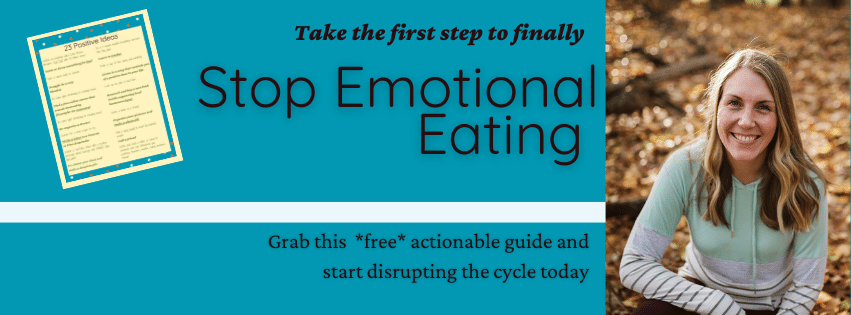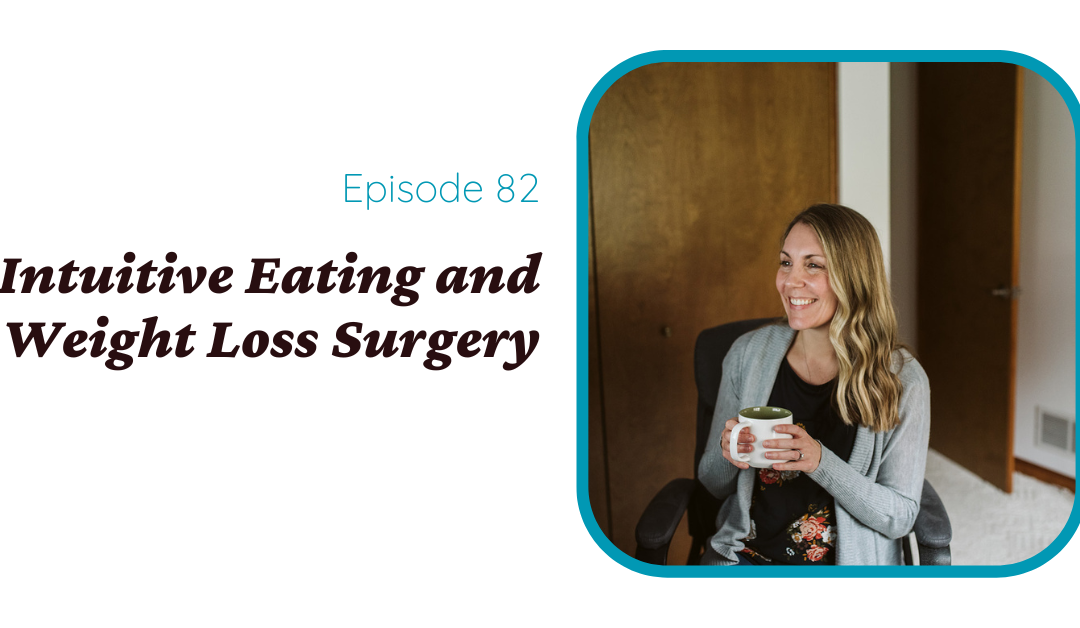Podcast: Play in new window | Download
Subscribe to Motivation Made Easy! Apple Podcasts | Google Podcasts | Spotify | RSS | More
Episode 82. A common question I get from people considering weight loss surgery is “will bariatric surgery help with binge eating?”, or “can I actually practice intuitive eating or a non-diet approach to eating after surgery”? or “How can I try to get rid of diet mentality if I have to follow a specific diet?” These are excellent questions and today you will get all my thoughts on these topics.
Not interested in learning about weight loss surgery? Totally cool. However, you might want to stay tuned because a lot of this topic will still apply to you. The second question is actually relevant regardless of whether you have weight loss surgery, or, have another medical condition were a specific eating pattern is recommended (e.g., avoiding gluten for those with Celiac disease, minimizing dairy for those who have a degree of lactose intolerance, or reducing intake of animal protein for those who have heart disease or want to protect animal rights).
What to Expect In This Episode
- The most common questions I get about bariatric (aka weight loss surgery) and intuitive eating
- What the research says about weight loss surgery and intuitive eating
- How autonomous motivation fits into all of this
- What you need to know if you or someone you love has had surgery or is considering it
Ready to Break the Binge Eating Cycle for Good?
Ready to stop avoiding and break the binge eating cycle for good?
The first step is to disrupt the cycle.
My free practical guide has 23 positive ideas for things to do instead of eating. Don’t worry, you wont find the standard diet culture BS advice (take a walk, have some water!)
Take the first step to finally stop binge eating and grab my free practical guide today!

Weight Loss Surgery & Intuitive Eating – Can They Be Friends?
At first glance, these fields may seem like complete opposites.
How on earth can you “reject the diet mentality” and still pursue a surgery that requires a specific diet and imposes long-term limitations (often) on what it’s recommended that you eat, and the amount that feels comfortable to eat with your post-surgical stomach?
I get the confusion. And frankly, this topic is controversial and not everyone will agree with me on this. That said, I definitely do think that you can learn or re-learn to be an intuitive eater before or after having bariatric surgery.
In fact, our conversation just last episode with Amy Braden is living proof of this.
To check on this, let’s review the 10 principles of Intuitive Eating.
- Reject the diet mentality.
- Honor your hunger.
- Make peace with food – including unconditional permission to eat.
- Challenge the food police.
- Discover the satisfaction factor.
- Feel your fullness.
- Cope with your emotions with kindness.
- Respect your body.
- Movement – feel the difference.
- Honor your health – gentle nutrition.
Easier to Swallow? No Pun Intended
It seems to me that the principles of honoring hunger and fullness, and coping with your emotions with kindness are likely less controversial. This is consistent with principles of mindful eating and awareness, and in my experience, most people whether or not they have had surgery, are on board with these concepts.
Reject the Diet Mentality
Quote from Intuitive Eating website:
Throw out the diet books and magazine articles that offer you the false hope of losing weight quickly, easily, and permanently. Get angry at diet culture that promotes weight loss and the lies that have led you to feel as if you were a failure every time a new diet stopped working and you gained back all of the weight. If you allow even one small hope to linger that a new and better diet or food plan might be lurking around the corner, it will prevent you from being free to rediscover Intuitive Eating.
Although I’ve said before and I’ll say it again I think you can reject the diet mentality after bariatric surgery, reading this description of the principle is a reminder of why this statement may be confusing.
How can you “get angry at diet culture that promotes weight loss” and still pursue surgery?
Although this has nuance, you can absolutely be angry at the lies that long term substantial weight loss should be achievable and easy for all, and still choose bariatric surgery.
The reality is that for many people, likely due to their genetic makeup and/or a long history of dieting, their body size and biological set point (the weight their body wants to maintain when not restricting, see this episode and post for more detail on this) will end up being higher than they would like it.
Although they should feel free to pursue health promoting behaviors at that body size without worrying about losing weight, many people decide they still desire weight loss.
And weight loss surgery is more effective at long-term weight loss than behavioral weight loss (making behavioral changes, typically reducing calories).
Research Supports Intuitive Eating After Surgery
Post Operative Intuitive Eating
In a small study of 90 post operative patients (3 months to 5 years post-op), it was found that higher Intuitive Eating Scores were associated with more satisfaction from meals, more mindful eating patterns, and more self-efficacy with maintaining eating patterns long term.
That is, they were more confident in themselves that “I got this.”
People scoring higher in intuitive eating after surgery also felt more in control of their eating, were more likely to have a positive relationship to food, and were more likely to make time for relaxation, and regular physical activity.
On the flip side, people who were more intuitive eaters had less emotional eating, less fear of weight regain, and lower levels of stress. They also had a lower likelihood of prioritizing other’s needs before their own.
In other study, a similar finding was observed in a larger group of post-op females (N = 401) where intuitive eating was also associated with more weight loss.
Things to Remember About Binge Eating and Weight Loss Surgery
Although there isn’t a ton of research in this area, the research that exists is supportive of people who want to take an intuitive eating based approach post-bariatric surgery.
That said, here are some things to keep in mind as it relates to bariatric surgery, binge eating, and intuitive eating.
- Weight loss or bariatric surgery (or any specific diet for that matter) is unlikely to cure your binge eating long-term. The most common regret I hear from people post-surgery (actually from anyone in therapy) is that they wish they’d sought out resources like therapy sooner to address their relationship with food.
- The weight loss focus of bariatric clinics can be tough to navigate alone. Because the worlds of intuitive eating and bariatric surgery don’t have a ton of overlap, it’s essential to find people who can help you with your specific experience. That is, if you are working on building self-trust and listening to your body, you may need to communicate to your bariatric surgery clinic what is and isn’t helpful to you (e.g., talking about food quality versus amounts, or focusing less on the scale and more on overall health).
- Working with your body, instead of against it, works. I’ve been doing this work for many years now, and I’ve never been more convinced of its effectiveness. We need more data to confirm this, but my anecdotal experience of many years working with folks who had bariatric surgery, is that a self-trust based approach provides a sustainable and enjoyable solution that can be a breath of fresh air.
- You can trust your body, and you can trust yourself. So much of what I work on with people 1 on 1 is regaining a sense of trust in themselves and their body. It takes time and effort to re-learn to listen to your body’s signals, after sometimes an entire lifetime of trying to ignore or suppress them. The cool thing is, your body is resilient. As Amy said last episode, “your body will forgive an awful lot.”
Support Local Bookstores Near You!
Did you know that that if nothing slows their momentum, Amazon will have almost 80% of the book market by the end of 2025?
Look, I love the convenience of Amazon, but I’ve got a super cool way that you can support local bookstores and my blog and podcast simply by buying books like you already do! You can choose any bookstore on the list in the US (they plan to expand to other counties in the future) OR you can just let the donation get split between all stores. They have raised over 15 million dollars for local bookstores. On my bookshop, you will see my absolute favorite books related to health and wellness, courage and vulnerability, and even my favorite fiction and kids books!
My recent favorite related to achieving a deeper level of healing is No Bad Parts: Healing Trauma and Restoring Wholeness with the Internal Family Systems Model. This book and model of therapy has been very helpful to me personally and I’m also using it with clients and seeing great results.
So if you believe in supporting local businesses and want to support my blog and podcast, please consider buying your books through Bookshop from now on!
The Psychology of Wellness Bookshop Link.

Disclaimer: This blog and podcast is for informational and educational purposes only. It is not a substitute for individual professional advice or treatment, including medical or mental health advice. It does not constitute a provider patient relationship.
Disclosure: Using the Bookshop.org links in this post means that I would get an affiliate fee if you purchase from the online bookshop (this supports my business, and local bookstores too!).
